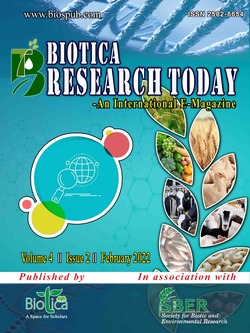
Important Pests of Potato and Their Management
Roop Singh Dangi
Dept. of Agronomy, College of Agriculture, RVSKVV, Gwalior, Madhya Pradesh (474 002), India
Neelam Singh*
Dept. of Agronomy, College of Agriculture, RVSKVV, Gwalior, Madhya Pradesh (474 002), India
Ekta Joshi
Dept. of Agronomy, College of Agriculture, RVSKVV, Gwalior, Madhya Pradesh (474 002), India
Deep Singh Sasode
Dept. of Agronomy, College of Agriculture, RVSKVV, Gwalior, Madhya Pradesh (474 002), India
DOI: NIL
Keywords: Damage, Infestation, Pest, Potato
Abstract
Potato (Solanum tuberosum L.) is the most important dicotyledonous plant and important source of human food. It is an important cash crop of India and the fifth major food crop of the world. The crop requires cool, temperate regions or elevation of approximately 2,000 m. The cultivation needs cool nights and well drained soil with good moisture. But the crop is attacked by variety of insects. The crop yield has increased steadily but the pest has been a major constraint limiting the crop yield potential. Due to diverse climate of India, the insects differ in their feeding habits. The pests of potato can be classified as sucking pest or sap/ foliage feeders, defoliators, nematodes, etc.
Downloads
not found
Reference
Rondon, S.I., 2010. The potato tuber worm: a literature review of its biology, ecology, and control. American Journal of Potato Research 87, 149-166.
Widagdo, H., Ketelaar, J.W., 2006. A Handbook to the Ecology and Integrated Management of Potato. International Potato Center and FAO Regional Vegetable IPM Program in South and Southeast Asia, p. 41.
